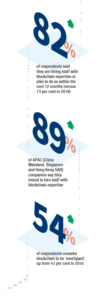
Global CEOs assess their blockchain options
The concept of blockchain had remained just that—a concept—for many CEOs, despite the best efforts of their technology teams to persuade them otherwise. In the past couple of years, however, organisations are increasingly making plans for practical implementation of the technology. This article by EURObiz is based on a Deloitte Insights global survey on blockchain that shows how leaders now see it as a top-five strategic priority and are increasing their investments in staffing and blockchain technologies.
———————————
In 2020, the C-suite has been putting money and resources behind blockchain as a strategic solution in more meaningful and tangible ways—in projects big and not so big—setting in motion more widespread blockchain processes, controls and even new business models. As with any business solution, there are still real-world challenges to overcome. However, this year, in-production proof points across a wide variety of implementation scenarios demonstrate that blockchain technology works—and can work—for many different organisations, businesses and industries.
A key trend has emerged: ever more positive thinking around current blockchain applications, continuing the acceptance of blockchain observed in surveys from previous years. The number of respondents who strongly or somewhat see blockchain as broadly scalable ticked up to 88 per cent, compared to 86 per cent last year and 84 per cent in 2018.[1] Those who said their company will lose a competitive advantage if they don’t adopt blockchain also increased to 83 per cent, up from 77 per cent last year and 68 per cent in 2018. Some 86 per cent of respondents said blockchain offers a compelling business case, versus 74 per cent in 2018.
Respondents across various regions offered strong positive sentiment. On blockchain’s scalability, for example, respondents from countries and regions such as the Hong Kong Special Administrative Region (SAR), Brazil, Israel and the United Arab Emirates (UAE) registered above-average sentiment. On the issue that organisations would sacrifice competitive advantage by not adopting blockchain, respondents from Mainland China, Ireland and Canada showed above-average sentiment.
Of course, attitude alone doesn’t drive blockchain adoption. But sentiment matters, because it leads to investment and confidence. To that end, the survey reveals that companies continue to put hard-earned dollars into blockchain initiatives. For example, 82 per cent of respondents said they are hiring staff with blockchain expertise or plan to do so within the next 12 months (versus 73 per cent in 2019). That number jumps to 89 per cent for companies with revenue greater than United States dollars (USD) 100 million. APAC (Mainland China, Singapore, Hong Kong SAR) served as a leading region in hiring, with 89 per cent agreeing with this statement. Other metrics from the survey also point to steady or increasing blockchain investment levels.
To be sure, as companies adopt and implement blockchain solutions—and as leaders increasingly accept blockchain as a fact rather than a future breakthrough—there remains an underlying level of uncertainty about current and future applications of blockchain technologies. Organisations will not sort this all out right away—this process will continue to take time, depending on industry, maturity, risk tolerance and budgets. Some remain skeptical: while respondents generally expressed positive sentiments, several data points indicate that this is not unanimous. For example, the number of respondents who consider blockchain to be ‘overhyped’ actually rose significantly this year, hitting 54 per cent versus 43 per cent in 2019 and 39 per cent in 2018. Additionally, those who think blockchain offers more security than conventional information technology systems fell to 64 per cent from 71 per cent in 2019.
But notwithstanding such cautionary notes, new blockchain implementations seem to find expression on a nearly daily basis. These production proof points are the clearest signs yet that blockchain is making a tangible difference in how business gets done across regions and industries.
Regional analysis
Asia Pacific
In the Asia Pacific region, there continues to be strong belief in the strategic value of blockchain. There is widespread recognition of blockchain as an important strategic tool, but, in addition, some countries and regions are much stricter than others about the free flow of data and information across— and within—their boundaries.

In Mainland China, for example, there remains some trepidation over how cross-border, multiparty blockchain configurations can and will affect their control over their business and governmental data. While cryptocurrencies remain illegal in Mainland China, the importance of private blockchains—and to some extent, permissioned blockchains—cannot be overstated. That said, because Mainland China also has restrictions on cross-border flow of data, it affects where companies set up shop.[2]
It is also worth noting that despite cryptocurrencies’ legal status in Mainland China generally, Beijing does see them—and digital assets more generally—as potential tools to help shake the US dollar’s dominance in global financial markets.[3] To that end, the Chinese central bank recently unveiled plans for a digital version of the renminbi on a trial basis.[4]
Private blockchains should remain a vital technology pursuit, especially given the size of Chinese industrials, their typically large numbers of subsidiaries and the vast amounts of data they produce. However, anyone who does business in China needs to find ways to accommodate the facts on the ground, including regulatory realities that could affect their business.[5]
Outside of Mainland China, cryptocurrency remains the coin of the blockchain realm in regions such as Hong Kong SAR and Singapore, which have a more accepting ethos about cryptocurrency than Mainland China has. They’re competing for a different, freer kind of business and have been going head-to-head in developing a regulatory landscape that is more conducive to the growing acceptance of cryptocurrencies.[6] Such healthy competition could ultimately accelerate cryptocurrencies’ acceptance in the broader marketplace.
Europe

Throughout Europe (including the United Kingdom (UK) for the purposes of this article), blockchain remains a priority, with different markets adopting distinctly positive, albeit different, approaches to the technology. In Germany, blockchain has gained new momentum as policymakers have actively engaged the legislative process. Examples of such legislative initiatives include the publication of a draft law to regulate the offering of cryptocurrency tokens, as well as public support and promotion of lighthouse projects that use blockchain technologies in the national administration.
In the Nordic region, there is continued growth around distributed ledger technology, which both local governments and business are using.[7]
The UK market is seeing ongoing and increasingly mature activity across key sectors with several substantial projects now live, typically among industries reliant on complex, multiparty and international supply chains. Additionally, there is a hastening of activity linked to digital assets, both in traditional sectors as well as in areas such as custody services.[8]
Concluding thoughts: The road taken
Over the past year, we have witnessed progress in the adoption and implementation of real-world blockchain-enabled solutions across a variety of businesses and sectors.
Attitudes toward blockchain have obviously, and measurably, shifted as executives and business leaders implement blockchain-enabled solutions, whether through the use of digital assets specifically or innovative applications of blockchain more generally. Organisations have stepped up their investments, demonstrating their commitment to blockchain technologies.
Still, progress along the implementation continuum is not always detectable to the naked eye. Only by looking more closely and seeing how organisations are responding to challenges with cybersecurity; global digital identity; compliance with established accounting, audit, internal control, tax and financial reporting frameworks; and governance and other consortium-related issues, can we see that blockchain has already pivoted from the realm of the possible into the world of the practical. The survey demonstrates real doing across industries and regions versus mere planning.
Blockchain was once recognised only as the foundation for cryptocurrency; today, leaders accept it as a robust solution that enables advances in 3D printing, artificial intelligence, digital security and beyond. And this acceptance is not mere words but hard-dollar strategic investments.
Blockchain already is an integral and vital tool upon which—and with which—new, cutting-edge solutions are being created, and blockchain solutions will likely gain even greater traction within the global business community over the next 12 to 24 months.
—————————————-
Note: This text is an abridged version of a report by Deloitte Insights, Deloitte’s 2020 Global Blockchain Survey: From promise to reality, the third survey in this series.
Deloitte is a leading global provider of audit and assurance, consulting,
financial advisory, risk advisory, tax and related services. Our global network
of member firms and related entities in more than 150 countries and territories
(collectively, the ‘Deloitte organisation’) serves four out of five Fortune
Global 500 companies.
[1] Figures represent the percentage of respondents who strongly or somewhat agree with each statement.
[2] Simone McCarthy, Will China’s revised cybersecurity rules put foreign firms at risk of losing their secrets?, South China Morning Post, 13th October 2019.
[3] Michael J. Casey, Why the US shouldn’t let China dominate the digital currency race, Fortune, 7th April 2020.
[4] David Pan, China will ‘undoubtedly’ pursue digital yuan, central bank says, CoinDesk, 6th April 2020.
[5] Fan Long, China is opening doors to blockchain—private and public, Cointelegraph, 30th December 2019; Library of Congress, Regulation of cryptocurrency: China, 16th August 2019.
[6] Franca Ciambella and En-Lai Chong, Blockchain & cryptocurrency regulation 2020: Singapore, Global Legal Insights, 2020; Tim Alper, New Singapore crypto tax rules could help it compete with Hong Kong, Cryptonews, 29th July 2019.
[7] Elena R, Cryptocurrency in the Nordic countries: 2019 results, CoinPedia, 14th December 2019.
[8] Stuart Davis, Sam Maxson, and Andrew C. Moyle, Blockchain & cryptocurrency regulation 2020: United Kingdom, Global Legal Insights, 2020.


Recent Comments